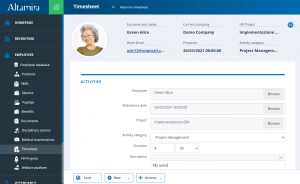At the beginning of the year, we published an analysis of the main trends predicted for 2020 in the Human Resources sector.
That list of trends has been disrupted by the current pandemic, which is pushing companies and HR departments to review their budgets and priorities.
The focus has shifted to digital tools that support and facilitate remote working, while other investments and technologies have taken a back seat.
Here are some of the clearest signals coming from the HR Tech sector.
Is this the end of the on-premise model?
For many years, we have been seeing a growth in cloud-based solutions and a steady decline in on-premise solutions.
The advantages of the former are well known: they don’t require significant IT department involvement or maintenance, they are more modern and are constantly updated, they have higher safety and compliance standards, they are more flexible, etc.
However, the progressive abandonment of the on-premise model will be determined by what is turning out to be a fatal flaw: unlike cloud-based solutions, it is not suitable to support smart working.
As a result, companies using on-premise HR systems will tend to replace them with cloud-based solutions. This is especially true for attendance monitoring systems, which can no longer do without virtual clock-in/out.
Also contributing to the transition from on-premise systems to the cloud is the slashing of budgets for the purchase of company computers and servers.
Interest in video interviews is increasing
For a couple of years now, video interview software has taken up an important role in candidate search and selection processes.
So far, companies have used these solutions primarily as a pre-screening tool. Once they have received a good number of applications and identified the most promising ones, they send a list of questions to a small group of candidates which need to be answered on video. In this way, they manage to get to know more candidates before inviting them to a face-to-face interview.
During these weeks in which face-to-face interviews are suspended, the use of live video interviews has increased even more. Although they cannot 100% recreate the experience of a face-to-face interview, they are the best tool that makes it possible to bring a fully digital selection process to completion.
Artificial Intelligence is seeing a slowdown
The economic crisis is reducing the budgets available to companies, which will have to prioritize the investments that are more useful for the management of remote work. In particular, projects for the introduction of Artificial Intelligence solutions, which are expensive and no longer a priority for many companies, are expected to slow down considerably.
The first estimates in this regard are coming from the United States, where, at the beginning of March, 48% of CIOs were already predicting a cut in funds for AI.
The boom in online training
The biggest revolution taking place in the HR sector—apart from working from home—concerns the ways in which training is organized and delivered.
This change can be seen clearly in the education sector, with millions of students accustomed to face-to-face classroom-based lessons who are suddenly finding themselves catapulted into the virtual world.
Many school system were not ready to manage this transformation, which is creating an ever-widening gap between the richest and most modern schools and those with fewer resources, and a loto of businesses were likewise poorly prepared.
Therefore, the implementation of e-learning solutions has become a priority for many businesses and training companies, especially for managing the delivery of mandatory courses such as those on workplace safety.
Is it still possible to do without digital document management?
Like the country’s school system, the public administration of many countries was unprepared for the digital challenge. It only took a few weeks for the resistance against change to begin to crumble, and more and more certificates and documents have started to be delivered online, without the need to go to public offices.
Even companies that are still making extensive use of paper-based documents—which are now sitting locked in filing cabinets in the deserted offices—now have clear evidence of the importance of dematerialization, and will be looking for solutions to digitize documents.
Fingerprint readers: when innovation goes awry
Biometric attendance monitoring terminals equipped with fingerprint sensors already had a very limited presence in Europe, mainly due to conflicts with the regulations on personal data protection (GDPR).
However, it looks like another issue will lead to their disappearance altogether. In order to clock in or out, all employees must place their fingertips on the same sensor. This mechanism is no longer merely unhygienic, but it has now become a significant risk, since it is a potential vector for contagion.
Expense accounts and business travel
In the coming months and years, a significant drop in business trips and business travel is expected.
Even after the pandemic ends, it is likely that the digital solutions adopted to replace them will continue to be used wherever possible, reducing both the costs incurred by companies as well as the environmental impact.
As a result, there will be less interest in expense account and business travel management solutions.
Copyright: ©Farknot Architect/Adobe Stock




























































































